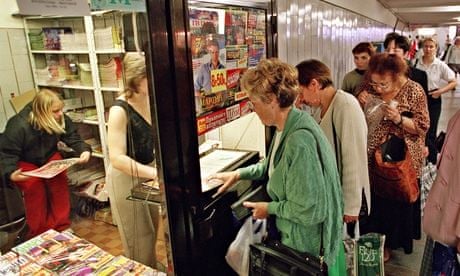'So will the Americans attack us now?" At my dentist's surgery in Moscow I am used to being the one nervously asking questions. Yet on the day after flight MH17 was brought down, everyone here – including my dentist, the receptionist and the guy fixing the receptionist's computer – wants me to tell them what will happen next. "You're a journalist. You probably know something we don't know," says the receptionist. "And I don't trust the television," says the receptionist.
In the aftermath of the horrific crash that took the lives of nearly 300 people, from here it looks as if it's turned a local conflict into a tragedy of global proportions. As the popular political observer Konstantin von Eggert noted in the Kommersant daily newspaper: "It won't be [the rebels] paying the price, it will be the Kremlin. Because it is Moscow, in spite of many denials issued by representatives, that is believed by the entire world to be [the rebels'] chief sponsor and protector."
Ordinary Muscovites, meanwhile, are expressing horror at the tragedy even as they entertain some of the wildest conspiracies imaginable. My dentist, Dmitry, has served in the military, and professes scorn for the rebels, whom he refers to as "undisciplined morons". At the same time, he says there is "another side" to the disaster. "Who benefits from portraying Russia as the monster? The Americans do," he says. "They want to go to war with the whole world."
At my local home improvement store, the young manager Vitaly launches into a tirade about how "there is an information war on" and that the US has every capability to frame "either Russia or the rebels." But he, too, has tremendous disdain for the separatists. "I don't even know what their goals are. It all seems pointless," he says. "They're trying to drag Russia into world war three. Fuck them."
A curious mixture of conspiracy theory and criticism for the separatists comes up almost every time I strike up a conversation on the fate of flight MH17. "Even if they didn't bring down the plane, I have no sympathy for these whackjobs," Konstantin, a man in late middle age who describes himself as "retired military", tells me as we queue up at the grocery store.
"Separatists mean too much liability – every good tactician will tell you that," Konstantin says confidently. Like many Russians, he believes that the new Ukrainian government is virulently anti-Russian, pro-western, and corrupt. Still, he doesn't think that Russia should have taken the "political risk" of supporting the rebels.
For Maria, a woman in her thirties who says she works on the radio, the MH17 disaster has invoked "feelings of a coming apocalypse. It's bad enough that all of these people are dead," Maria says. "But what if the war gets worse and more people die? How far will all of this go?"
In stark contrast to western tabloid headlines which speak of "Putin's missile" and "Putin's victims," most of the people I talk to in Moscow stop short of directly blaming the Russian president for the disaster. This is a lot to do with how Russia's involvement in east Ukraine is perceived to be chaotic and half-hearted to begin with. Unlike the annexation of Crimea, which saw well-trained Russian troops take control of the situation immediately, east Ukraine is a murky misadventure at best.
"The idea that the rebels are reporting directly to Putin is just funny," Konstantin says."I don't even know if there is any kind of established chain of command over there."
Vitaly is more strident, calling east Ukraine a "failure" from the start, and blaming Putin's advisers for "not advising properly." Vitaly doesn't understand how the president, whom he credits with lifting Russia "from its knees" after the turbulent 1990s, could have wanted to get involved in east Ukraine – unless "the facts were distorted for him".
Even among strong critics of Putin, there is the sense that the Russian president himself could not have seen it coming. "I never voted [for Putin], he's not my guy, and I don't agree with where he's steering the country," Yekaterina, a pensioner neighbour , tells me. "But this absolute horror, this shocking tragedy – I can't imagine he wanted that."
"Few people want to directly blame Putin," Maria says. "It makes sense. Russia has improved, but it's still a chaotic country. It's important for people to believe in least one person. And you can't discount the fact that the Ukrainian leadership isn't 100% trustworthy."
One would think that in a country where disasters frequently occur due to lack of accountability and poor judgment, more people would be willing to accept that what happened to MH17 was likely a mistake, almost banal in its horror. But for many Muscovites, the notion that some sort of conspiracy is nevertheless at work seems almost comforting, like a drug. Both television and online trolls are eager to provide more quantities of the drug at this time, by highlighting both outlandish theories that crash victims "may have been dead for weeks" and more mundane speculations of the Ukrainian armed forces trying to cover up the real cause of the disaster. "It's very hard for me to accept that this is all just someone's mistake," Vitaly tells me. "I don't know if I can do that."
None of this prevents people from identifying with the victims of MH17. "There were many children, I heard," Konstantin says. "Kids that probably never even heard of Ukraine, or the war, or anything like that. The innocents always suffer."
Natalia Antonova is a Moscow playwright and journalist
